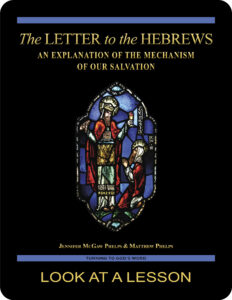guilt offering
 One of the more familiar Old Testament messianic prophecies of the Old Testament appears in the Book of Isaiah 53:10 (USCCB): “If he gives his life as an offering for sin, he shall see his descendants in a long life, and the will of the LORD shall be accomplished through him.” This is a fascinating passage on many levels, and the translation tends to miss a very important connection.
One of the more familiar Old Testament messianic prophecies of the Old Testament appears in the Book of Isaiah 53:10 (USCCB): “If he gives his life as an offering for sin, he shall see his descendants in a long life, and the will of the LORD shall be accomplished through him.” This is a fascinating passage on many levels, and the translation tends to miss a very important connection.
The word translated as “offering for sin” is the word used to describe a particular type of offering in Israelite religious practice—which also is known as a guilt offering, a reparation offering, or a trespass offering. These offerings are described several times in the fifth through seventh chapters of the book of Leviticus (NABRE). A few common themes stand out. The offerings involved make individual reparations or payback for any damage caused by sin—not only paying an equal amount but a fifth more along with the offering of an unblemished ram. Moreover, the book of Leviticus 7:1 (NABRE) describes such offerings as “most holy.”
Consider this verse from the Book of Isaiah again as a description of such an offering. What part does the person being described in this passage play? What’s still missing? What role do you think we might have in the making reparation for our own sins?
related topic: offering
you also may like our study of the Letter to the Hebrews (digital only)
 Many Christians struggle to understand one of the central mysteries of our faith: how Jesus can be both human and divine at the same time. The Letter to the Hebrews: An Explanation of the Mechanism of Our Salvation, an 18-lesson Catholic Bible study with an imprimatur, offers an in-depth look at the way in which Jesus’ dual nature allows for the salvation of humanity. The Letter to the Hebrews is designed to provide information that will encourage Christians to remain faithful. Click on the book’s cover to view a sample lesson.
Many Christians struggle to understand one of the central mysteries of our faith: how Jesus can be both human and divine at the same time. The Letter to the Hebrews: An Explanation of the Mechanism of Our Salvation, an 18-lesson Catholic Bible study with an imprimatur, offers an in-depth look at the way in which Jesus’ dual nature allows for the salvation of humanity. The Letter to the Hebrews is designed to provide information that will encourage Christians to remain faithful. Click on the book’s cover to view a sample lesson.
 Click on the picture of the statue of Moses with horns (above) to learn more about Lost in Translation. A new entry is archived each Monday. Contact us to receive Lost in Translation by email every week. You may use any of the contact links on our website to ask Matthew a question.
Click on the picture of the statue of Moses with horns (above) to learn more about Lost in Translation. A new entry is archived each Monday. Contact us to receive Lost in Translation by email every week. You may use any of the contact links on our website to ask Matthew a question.
